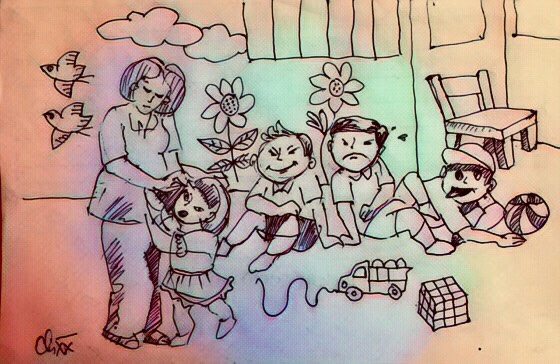 Talk Around Town
Talk Around Town

Preschool teachers usually work about 10 hours a day, exceeding normal working hours.

|
By Bích Hường
My four-year-old daughter often tells me about a little boy in her kindergarten. The boy is shorter and smaller than her and is the son of a teacher in the school.
“Kiên lợn ( piggy) goes to school earlier than me. Kiên talks too much. Today, Kiên gave me a toy. When grandfather picked me up this afternoon, Kiên was still playing at school.”
These are just some of the stories that my daughter told me about the little boy, which helped me understand that he usually goes to school early with his mother and leaves much later than his peers as he has to wait for his mother to finish her working day at the school.
The boy Kiên is not as old as my daughter but is in the same class as her as he cannot be in the younger class where his mother works.
One winter day, my daughter told me that Kiên had a day off. Seeing a post on his mother’s Facebook page, I knew he had a cold, possibly because he and his mother left home early a previous morning when it was very chilly.
Many kindergarten teachers have told me that they take care of others' children, but have little time for their own.
Đỗ Thu Hà, a former kindergarten teacher in a major school in Hà Nội, said a working day at kindergarten usually started at 7am to receive students and finished when all the kids went home. They don’t have time at noon to take a rest like those in other jobs because they have to take care of the students.
“Besides teaching, we are also in charge in preparing contents to teach at school, making toys and decorating classrooms, taking care of students’ eating, sleeping, playing and personal hygiene,” Hà said, adding that they not only work at school but also at home.
The heavy workload and pressure from school managers and students’ families pressed on them, Hà said.
Last week, when giving a contribution to the draft decree on retirement ages, vice president of Việt Nam General Confederation of Labour Ngọ Duy Hiểu suggested preschool teachers should be listed in groups of hard occupation and they should be allowed to retire at 55 or earlier.
Under Việt Nam’s Labour Code, as of this year, retirement ages will be increased gradually so from 2028, men will retire at 62 years old and from 2035, women at 60.
Those with arduous, toxic, dangerous works in disadvantaged areas or extremely harsh working conditions can retire up to five years earlier than the general retirement ages.
If preschool teachers were listed in the special group, they could retire at 57 for men and 55 for women.
Hiểu said preschool teachers usually work about 10 hours a day, exceeding normal working hours. They suffered from high working pressure, taking care of dozens of children at the same time. Their work was not to lecture but also to nurse, to dance and to sing.
Nguyễn Ngọc Ân, vice chairman of Việt Nam education sector’s trade unions, said that from 55 years old, preschool teachers struggled to perform their tasks in instructing students to dance, sing, do exercises, run or jump.
“High working pressure, particularly in ensuring safety for small children, lasts for a long time, negatively affecting teachers’ health,” Ân said.
Asking nearly 10,700 preschool teachers in a week, a survey by the trade unions found 96 per cent of the teachers wanted to retire at 55 years old, he said.
According to the Ministry of Education and Training, last year, 322,000 people worked as preschool teachers in Việt Nam. A survey by HCM City’s Centre for Diseases Control in 2018 showed among 379 surveyed preschool teachers, 34 per cent had difficulty in breathing and feel pains in chest, 30 per cent had a dry cough and nearly 69 per cent usually feel stressed.
Former head of Legal Department under Trade Union University Lê Thị Châu said that seeing that localities in Việt Nam faced a shortage of preschool teachers, it was needed to get detailed statistics about preschool teachers before deciding retirement ages for them.
The shortage of teachers also affected education quality, Châu said, adding that old teachers with experience and skills had advantages in doing their work.
Vice head of the Preschool Department under the Education and Training Ministry Cù Thị Thuỷ said when teachers were happy with their jobs and not exhausted with overloaded work, children would benefit.
I agree with Thuỷ and believe that happy teachers will help nurture happy children.
I think teachers’ mental and physical health affects the quality of education that they provide.
Hà, the former preschool teacher, told me she saw many young preschool teachers, particularly those working in private schools with a modest salary and heavy workload, reluctantly quit.
“Every job has its hardship and happiness. A key factor to keep people doing the work they chose is that they gain what they deserve,” she said.
Hà also said that she saw old teachers still worked well even though they had some physical limitations.
As long as the teachers can meet their job requirements, let them work. I think the retirement age should be flexible and should be decided by the teachers themselves. Both young and old teachers have their strengths. The thing that matters is how to inspire them to do their job well. — VNS




